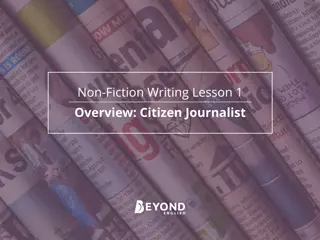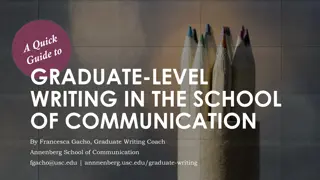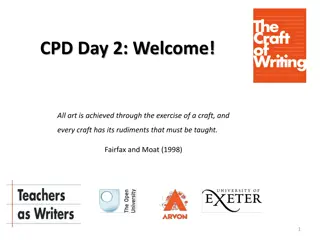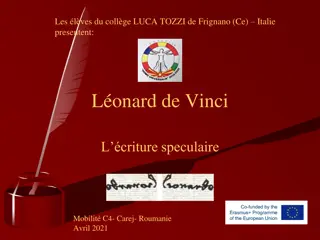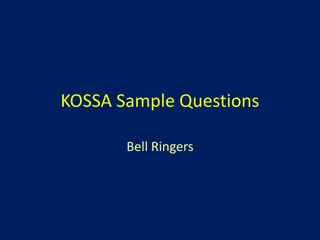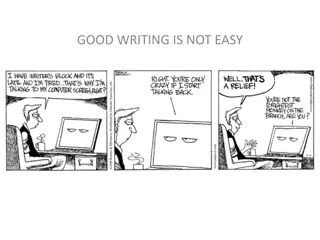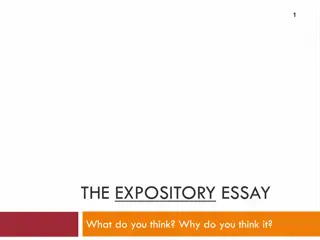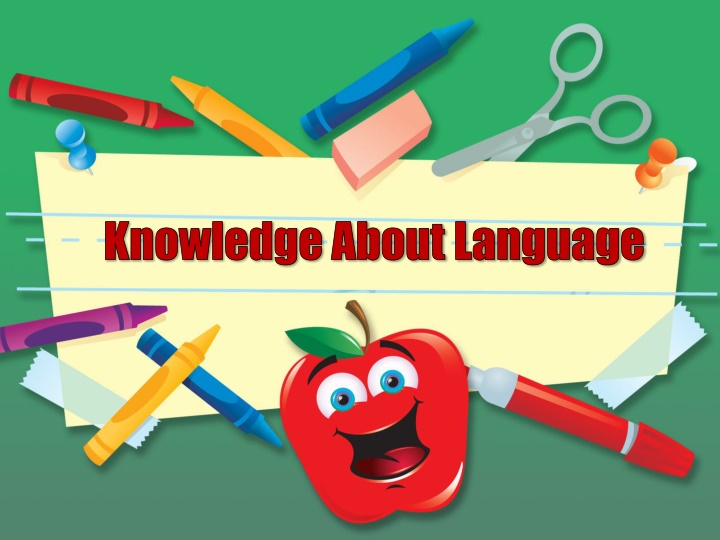
Enhancing Language Skills with Saw, Seen, Did, Done, and Relative Pronouns
Learn the differences between "saw" and "seen," "did" and "done," and how to use relative pronouns like "who" and "which" in sentences. Practice your skills with interactive tasks and improve your understanding of English grammar.
Download Presentation

Please find below an Image/Link to download the presentation.
The content on the website is provided AS IS for your information and personal use only. It may not be sold, licensed, or shared on other websites without obtaining consent from the author. If you encounter any issues during the download, it is possible that the publisher has removed the file from their server.
You are allowed to download the files provided on this website for personal or commercial use, subject to the condition that they are used lawfully. All files are the property of their respective owners.
The content on the website is provided AS IS for your information and personal use only. It may not be sold, licensed, or shared on other websites without obtaining consent from the author.
E N D
Presentation Transcript
Saw Seen The word saw can be used on its own in a sentence. For example: Peter saw the curling match. The word seen cannot be used alone in a sentence. It has to have an auxiliary verb with it. For example: Peter has seen the curling match.
Task Fill in either saw or seen in the five sentences below. saw 1. Mary and I __________ that film last week. 2. Both of us had __________ it before you did. 3. I ________ you at the disco. 4. You were also ________ by Mary. 5. Jim _________ us before we had __________ him. seen seen saw seen saw
Did Done The word did can be used on its own in a sentence. For example: Peter did the maths homework. The word done cannot be used alone in a sentence. It has to have an auxiliary verb with it. For example: Peter has done the maths homework.
Task Fill in either did or done in the five sentences below. 1. Kate __________ the work by herself and ________ it well. 2. After she had ________ the work, she went out. 3. We _________ the shopping quickly. 4. I have _____________ my work early this week. 5. I think I have __________ better in the test this week. did did done did done done
Relative Pronouns Relative Pronouns are words such as who, whose, whom and which. These words are relative pronouns when they are used to join two small sentences together. They come in the middle of sentences, not at the start.
Who and Which Who is used for people. Which is used for animals and things. Examples I m not talking to my brother who is a pest. I m walking my dog which is a poodle.
Task Join the sentences below using who or which. 1. I spent 5. I found it in the park. 2. I bought pink and yellow sweets. They were disgusting. 3. I gave them to my little sister. She likes disgusting sweets. 4. She got sick and told my Mum. She was not pleased.
Whose Whose can be used as a relative pronoun. It is used to join two short sentences into one long one. It comes in the middle of the long sentence.
Whose Example I know the boy. His clothes are dirty and torn. I know the boy whose clothes are dirty and torn.
Task 1. We found a football shirt and wondered _________ it was. 2. It belonged to the new goalkeeper ________ had just joined the team. 3. We were all pleased with the new goalkeeper _________ managed to save a really good shot at goal. 4. He passed the ball to a defender _________ was fouled by the big Number 10 and who was given a free kick. whose who who who
Task 5. There was an argument about _________ free kick it was. 6. The Number 10 _________ foul had caused a slight injury was sent off. 7. The Referee ______ sent him off was mobbed by the players. 8. The other team _________ man had been sent off were furious. 9. The new goalkeeper _____ helped us win the game was a hero. whose whose who whose who
Relative Pronouns Relative pronouns (who, whom, whose, which) should be put as close as possible to the noun that they are attached to. If you don t do this, the sentence can seem muddled and strange.
Example Wrong: The bride was given away by her father, who wore a white silk dress. This is wrong because it seems to suggest that it was the father, not the bride, who wore the white silk dress. Correct: The bride, who wore a white silk dress, was given away by her father.
Task 1. The antique chair, which Dad handled carefully, cost a thousand pound. 2. The girl, who was the Major s daughter, married a soldier. 3. The pet shop manager, who had a long beard, kept a parrot. 4. The football crowd, who shouted until they were hoarse, helped the team win. 5. My aunt s new baby, who normally cries for half of the night, slept peacefully in my car.
Task 1. The antique chair cost a thousand pounds, which Dad handled carefully. 2. The girl married a soldier who was the Major s daughter. 3. The pet shop manager kept a parrot who had a long beard. 4. The football crowd helped the team win who shouted until they were hoarse. 5. My aunt s new baby slept peacefully in my car who normally cries for half of the night.
Those and Them It is important to use the correct word, those or them. You use those in front of a noun. For example: I like those CDs. You use them when there is no noun. For example: I like them.
Task 1. I don t know _______________ boys. those them 2. I have seen _______________. 3. We are going to see _______________ films. those them 4. They don t want to see _____________. them 5. Do you like _____________?
Task 6. I prefer _____________ films that are exciting. those them 7. What do you think of _____________? those 8. We are not thinking about ____________ exams. them 9. When do you have to sit ____________? them 10. I hope that you pass ______________.
Possessive Apostrophe the keyboard of Fiona = Fiona s keyboard Rule Find the owner Add the apostrophe Add s if there isn t oneFiona s Fiona Fiona
Possessive Apostrophe Some plural nouns will need s to be added but most of them will already have one. the car of my parents = my parents car Rule Find the owner Add the apostrophe Add s if there isn t one my parents car (There is!) my parents my parents
Possessive Apostrophe the boats of the fishermen = the fishermen s boats Rule Find the owner Add the apostrophe Add s if there isn t onethe fishermen s boats the fishermen the fishermen
Task 1. Policemens uniforms are being updated. 2. Why are childrens departments so often on the second floors of big stores? 3. The small childs handwriting was untidy but the letters were well formed. 4. Holidays Unlimited have been inundated with holidaymakers complaints. 5. Farmers incomes have been severely affected by the cut in subsidies.
Task 1. Policemen s uniforms are being updated. 2. Why are children s departments so often on the second floors of big stores? 3. The small child s handwriting was untidy but the letters were well formed. 4. Holidays Unlimited have been inundated with holidaymaker s complaints. 5. Farmers incomes have been severely affected by the cut in subsidies.
Task 1. It s my parents wedding anniversary on Monday. 2. The childrens party was a great success. There were fifteen girls and twelve boys. 3. The boxes of books were stacked at the end of the corridor. 4. Mrs Doak groaned, Girls voices are so much shriller than boys voices. I have such a headache! 5. Year 7s outing has been postponed.
Task 1. It s my parents wedding anniversary on Monday. 2. The children s party was a great success. There were fifteen girls and twelve boys. 3. The boxes of books were stacked at the end of the corridor. 4. Mrs Doak groaned, Girl s voices are so much shriller than boy s voices. I have such a headache! 5. Year 7 s outing has been postponed.
Possessive Apostrophe You use an apostrophe with an s ( s) to show that someone or something owns something. Remember the rules! Examples: Rover is Tom s dog. Richard s pen is broken. The restaurant s food is awful. The hut s roof is leaking.
Task Example The feathers of the bird are black. The bird s feathers are black.
Task 1. The car of the teacher is parked in the street. 2. The bag that John has is blue and white. 3. We don t like the food of this caf . 4. The headmaster of the school is called Mr. Green. 5. The sister of the girl is younger than she is. 6. The captain of the team is called Paul Turner.
Task 1. The teacher s car is parked in the street. 2. John s bag is blue and white. 3. We don t like this caf s food. 4. The school s headmaster is called Mr. Green. 5. The girl s sister is younger than she is. 6. The team s captain is called Paul Turner.
Proof Reading There are twenty errors in the extract below from Flat Stanley that have been deliberately introduced for you to identify and correct.
Shortening Apostrophe Sometimes when we speak we shorten what we say. For example, we don t usually say I am... We shorten it to I m
Shortening Apostrophe When we write this, we put the words together and put an apostrophe in instead of one (or sometimes two) of the letters. I am We are They are are not I m We re They re aren t
Task 1 Write the long version of these shortened words: 1. they re 2. can t 3. she s 4. haven t 5. weren t
Task 1 Write the short version of these words: 1. is not 2. he is 3. you are 4. they have 5. I have
Its and Whos It s mean it is or it has. E.g. It s been a long day. Its means belonging to it E.g. Its coat is dark and glossy.
Task 2 In the sentences below, fill in either it s or its. It s 1. __________ time for us to go home. 2. The dog chases _______ own tail. 3. I think ________ an eagle. 4. ________ got long feathers and a strong beak. 5. _____ claws look dangerous. Its its it s It s
Its and Whos Who s means who is or who has. E.g. Who s got a good job? Whose means belonging to who. E.g. Jake is a boy whose clothes are always dirty.
Task 3 In the sentences below, fill in either who s or whose. who s 1. I know ______ coming to the party. 2. _______ bag is this? 3. _______ got a joke they can tell us? 4. Can you tell me ______ marks were best? 5. _______ right and ______ wrong? Whose Who s whose Who s who s
Youre and Your You re (with an apostrophe and an e at the end) means You are. Example You re going to be late! Your means belonging to you Example Your glasses are in your pocket!
Task Fill in either you re or your in the sentences below. You re 1. _____________ in a hurry today! 2. I haven t seen _____________ homework yet. 3. Where is ____________ football kit? 4. I don t know what _____________ doing. 5. _____________ next in the queue. You re your your you re

